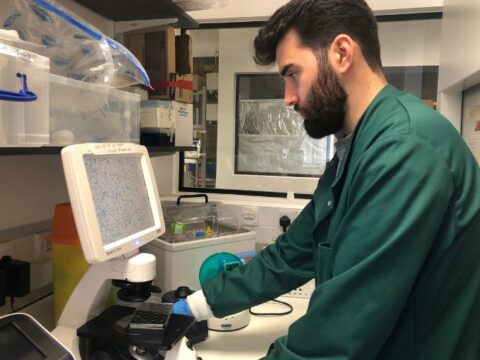
Inventor Dr Zeke Steer quit his job and took a PhD at Bristol Robotics Laboratory so he could find a way to help people like his great-grandmother, who became anxious and aggressive because of her dementia.
A sock which combines sensors with artificial intelligence could help carers and care home staff detect agitation and prevent falls in people with dementia.
The innovative ‘SmartSocks™’’ track heart rate, sweat levels and motion to give insight into the wearer’s wellbeing, providing accurate insight into a person’s cognitive state, and distress levels. They look and feel like normal socks, do not need charging and are machine washable. Current physiological monitors are frequently worn on wrist straps, which can stigmatise or even cause more stress, and are frequently removed by patients.
Care technology start-up Milbotix™, who developed SmartSocks™, has partnered with teams at two UK institutions to test the technology. In one project, Milbotix™ is working with the University of Exeter to test whether SmartSocks can help staff working in care homes support people who may not be able to communicate agitation, or the cause of distress. Milbotix™ is trialing Smart Socks™ in a network of care homes managed by Southern Healthcare, with a research team at the University of Exeter evaluating the pilot study.
In a second, separate study, Milbotix™ is working with a team at the UK Dementia Research Institute (UK DRI) Care Research & Technology Centre, at Imperial College London, who are developing ‘smart home’ technology to enable people living with dementia to remain in their own homes for as long as possible. In this study, the team from the UK DRI at Imperial College London will first test SmartSocks™ in their living lab, a domestic environment where they study activities of daily living and develop technologies before they can be tested in the home. Then they will deploy it in in the homes of 15 people living with dementia to assess the capability of the socks to detect distress and agitation in the wearer. Both studies are funded by Innovate UK.
SmartSock™ inventor Dr Zeke Steer, Chief Executive Officer of Milbotix, came up with the concept after witnessing his great grandmother’s dementia journey, during which she became aggressive and anxious. Motivated to improve care for people with dementia, Dr Steer gave up his job in the defence industry to gain a PhD in robotics, during which he developed and tested SmartSocks™
“I came up with the idea for SmartSocks™ while volunteering in a dementia care home,” said Dr Steer. “The current product is the result of extensive research, consultation and development. So far SmartSocks™ have been incredibly well-received in care settings, and I’m excited to see what impact our products can have in providing early alerts of agitation and falls, enabling care home staff to take early intervention, and support people to stay in their own homes for as long as possible.
“The foot is actually a great place to collect data about stress, and socks are a familiar piece of clothing that people wear every day, our research shows that socks can accurately recognise signs of stress – which could really help not just those with dementia, but their carers too.”
SmartSocks™ will be trialed in people with dementia living in care homes owned by Southern Healthcare, located across the Southwest of England. Dr Byron Creese, at the University of Exeter, will evaluate their efficacy at providing early alerts to staff of heightened agitation, the risk of falls, and whether SmartSocks™ improves care.
In Exeter, the research is supported by the Exeter NIHR Biomedical Research Centre. Dr Byron Creese, of the University of Exeter, said: “SmartSocks addresses the huge clinical need for effective and safe management of agitation, pain and distress in dementia. We have world-leading research and clinical expertise in these aspects of dementia and we’re really excited to be joining Milbotix™ on this project.”
Margot Whittaker, Director of Nursing and Compliance at Southern Healthcare group, said: “I think the idea of SmartSocks™ is an excellent way forward to help detect when a person is starting to feel anxious or fearful. At Southern Healthcare, we are always looking at ways of improving the experience for our residents, and we’re committed to ensuring evidence-based care. This pilot certainly contributes to this goal.”
The UK DRI Care Research & Technology Centre at Imperial College London is already piloting technology that monitors sleep, movement around the home, and physiological measurements such as temperature and blood pressure. A centralised computer platform called ‘Minder’ connects these measurements to a dashboard, enabling clinicians to remotely monitor people living with dementia. Using this technology, the team aims to detect problems early, reduce avoidable hospitalizations and ultimately empower people living with dementia to remain independent in their own homes for longer.
SmartSocks™ will enable clinicians to remotely detect when a person’s cognitive state changes, which is not possible with existing devices.
Dr Shlomi Haar, Emerging Leader at the UK Dementia Research Institute Care Research & Technology Centre at Imperial College London, said: “I’m really excited about this project, which has the potential to transform care for people affected by dementia. As a world leading centre in the development of smart homes for dementia we have tried multiple wearable devices but we find the technology is not always suitable or comfortable for people to wear for extended periods. SmartSocks™ should resolve this issue, since the socks look and feel exactly like normal socks. Combining the socks with our existing technology will greatly expand our capabilities to monitor, understand and anticipate the needs of people living with dementia, and support them to remain safely within their own homes for longer, whilst also reducing the burden on carers.”
Sarah Daniels, Health and Social Care Lead at the UK Dementia Research Institute Care Research & Technology Centre at Imperial College London, said: “Wearable devices are fast becoming an important way of monitoring health and activity. At our centre, we have been trialing a range of wrist bands and watches. However, these devices present a number of challenges for older adults and people affected by dementia: they don’t hold charge for long; people often remove and subsequently misplace them. We have also found that those who like to wear a watch, prefer to wear their own and that those with more fragile skin, are at risk of pressure areas and skin irritation. SmartSocks™ offer a new and promising alternative which could avoid many of these issues. I am excited to be involved in this project and look forward to working with the product around the acceptability and accessibility for people affected by dementia.”
About the University of Exeter
The University of Exeter is a Russell Group university that combines world-class research with high levels of student satisfaction. Exeter has over 30,000 students and sits within the Top 15 universities in The Guardian University Guide 2023, and in the top 150 globally in both the QS World Rankings 2022 and THE World University Rankings 2023. In the 2021 Research Excellence Framework (REF), more than 99% of our research were rated as being of international quality, and our world-leading research impact has grown by 72% since 2014, more than any other Russell Group university. https://www.exeter.ac.uk/
About the UK Dementia Research Institute
The national UK Dementia Research Institute (UK DRI) is the single biggest investment in dementia research in the UK. Established in 2017 by its founding funders, the Medical Research Council, Alzheimer’s Society and Alzheimer’s Research UK, the multi-million-pound Institute is hosted across six leading UK universities: University of Cambridge, Cardiff University, University of Edinburgh, Imperial College London and King’s College London, with its central hub at UCL. The UK DRI works on ways to prevent, treat and care for people with all types of dementia, and ways to keep the brain healthy. www.ukdri.ac.uk
About Imperial College London
Imperial College London is a global top ten university with a world-class reputation. The College’s 22,000 students and 8,000 staff are working to solve the biggest challenges in science, medicine, engineering and business.
The Research Excellence Framework (REF) 2021 found that it has a greater proportion of world-leading research than any other UK university, it was named University of the Year 2022 according to The Times and Sunday Times Good University Guide, University of the Year for Student Experience 2022 by the Good University Guide, and awarded a Queen’s Anniversary Prize for its COVID-19 response. https://www.imperial.ac.uk/

 Print This Post
Print This Post





